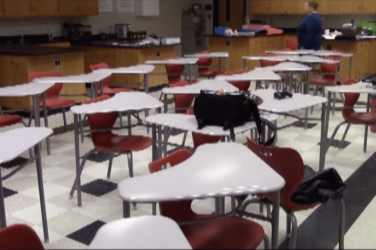When Sam Clark, a fourth-year sociology major from Cartersville, decided to live off campus her second year as a student at the University of Georgia, roommate options were limited. Her friends made more expensive housing choices than she did. By the time Clark decided to find an apartment, she had less potential roommate choices. Therefore, she decided to live with random roommates for convenience.
All my friends were living in bougie places and I was like, ‘Uh oh, let me find somewhere to live,’ so I kind of took what I could with my budget,” Clark said.
Why It’s Newsworthy: With a median gross rent of $799 from 2012 to 2016, according to 2016 U.S. Census Bureau data, some college students to seek roommates, especially when many apartment options for students rent by the room. As there is an increase in rental housing units and rent costs, college students are having to consider living with random roommates as an economic necessity.
Of the 48,534 housing units available in Clarke County, more than 54 percent were renter-occupied, according to data from the 2016 Georgia Initiative for Community Housing. The Initiative also found that of the 2,255 new apartments built between 2005 and 2015, 67 percent were student-oriented.
Brittany Nelson, the leasing specialist for Polo Club Athens, a student apartment community owned by the Collier Companies, said that while doing roommate matches for residents this summer, she found approximately 65 to 75 percent room matches included random roommates.
Roommate matches are made according to a questionnaire included in the application. Potential residents answer questions about work schedule, preferred roommates, personality, room temperature and others.
While Polo Club Athens offers two-, three- and four-bedroom apartments, rates vary for each one. Last year, the cost of a two-bedroom flat was $579 a month versus a four-bedroom flat costing $459 a month, according to Nelson.
“You are paying a little bit more to have two less roommates, one less roommate to be in a two-bedroom, which for some people [is] worth that extra [cost],” said Mabel Nunez, the floating community manager for Collier Companies.
Additionally, leasing with Polo Club Athens requires residents to have a guarantor, who is usually a parent or family member above 27 who will co-sign. As part of the agreement, the guarantor must have a monthly income three times the monthly rent, which can make the $120 price difference an important factor for residents whose rely on a lower-income guarantor.
Polo Club Athens rents by the bed year-round, which means that as vacancies open, an effort is made to get future potential residents moved in. Therefore, matching is often done based on timing and who best fits the housing profile.
Clark, who lived at a neighboring apartment, the Reserve at Athens, stayed in a four-room and four-bathroom apartment with one male acquaintance and two random roommates who had lived there before her. While she was told by her housing that she and her friend would be paired with another co-ed pair, she did not find out who she was moving in with until the month before move-in for the fall semester.
For Clark, the main issue was one of boundaries, which included a roommate moving guests in without consulting other roommates or another roommate doing illegal drugs in shared common areas.
“You can’t really set ground rules because [my two random roommates have] already been living there for two years and already have their own thing going,” Clark said.
Valerie King, a third-year student from Chattanooga majoring in philosophy, women’s studies and history, found a similar issue with communication while living with a friend and two random roommates at Park Hillside her second year.
King did not find out who the two random roommates were until a month before moving in. King said living with her new roommates initially went well until one roommate allowed her partner to move in without asking permission and had multiple guests come over on school nights.
Living with my best friend was cool but living with a stranger and her boyfriend and all of her friends is not as cool,” King said with a chuckle.
Nelson said roommate issues at Polo Athens are often settled through roommate remediation.
“We give [residents] the opportunity to come in and talk with the property manager [Nunez] about their issues,” Nelson said.
Nunez offers options that can range from a group discussion to moving residents to different apartments as space opens.
Off-campus apartments are not the only housing options available to students. Of the 36,574 students enrolled at UGA, according to UGA Admissions, over 8,300 live on campus, according the UGA housing website.
For Chloe Hamby, a fourth-year political science major from Douglasville, the decision to live on campus made economic sense for her. Hamby, who receives student loans, the HOPE scholarship and a Pell Grant, said her financial aid refund did not come early enough to put a down payment on an apartment.
“I don’t have a consistent, stable income to where I could pay monthly payments either. My refund would help with that, but because of the fact that it comes . . . days before classes start and I don’t have a car, it’s just easier for me to stay on campus,” Hamby said.
Last year, Hamby planned to stay in Building 1516. However, she received an email from university housing offering incentives to current housing residents to allow UGA housing to buy-out their 2017-2018 contract. A higher-than-planned enrollment rate and then-ongoing renovations to Russell Hall, a freshman high-rise dorm, led to a housing shortage, according to the Red & Black.
There were two incentive options. Residents could transfer to Brown Hall, a dorm located on Health Sciences campus, at a discounted rate of $1,462 for the entire academic year. The second option was to simply have their contract bought out for $3,500.
Hamby chose to live in Brown Hall, where she was then paired with a random roommate. She said since she was a junior and many of her peers lived off campus; she did not have a friend to room with. However, she liked the experience of random roommates and still lives with her roommate from last year.
Hamby, who graduates this year and is looking to work as a paralegal in either New York or Washington, D.C., plans to continue living with roommates after she graduates this spring.
“If I don’t move in with my significant other . . . then I’ll probably do random roommates because it just makes sense, especially in cities. It just makes it cheaper,” Hamby said.
Danny McArthur is a fourth year majoring in journalism in the Grady College of Journalism and Mass Communication at the University of Georgia.






